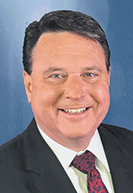Subscriber Benefit
As a subscriber you can listen to articles at work, in the car, or while you work out. Subscribe Now
In its 31-page opinion on House Enrolled Act 1123, the Indiana Supreme Court devoted 10 pages to rejecting all of Indiana Attorney General Todd Rokita’s arguments that the governor should not have been permitted to even file his lawsuit.
The dispute between the governor and the attorney general began when Gov. Eric Holcomb hired Lewis Wagner LLP in Indianapolis and, in April 2021, challenged the constitutionality to HEA 1123. Under the law, the Legislature had the power to call itself into an emergency session. However, Rokita immediately asserted the governor could not enlist outside counsel without the consent of the attorney general’s office.
In addition to finding HEA 1123 violates the Indiana Constitution, the Supreme Court examined each of the attorney general’s arguments in Holcomb v. Bray, et al., 21S-PL-518, and dismissed them all as unpersuasive. In particular, the justices showed little patience for the assertion that a previous ruling from the Supreme Court “impliedly repealed” the statute allowing the governor to employ counsel. Also, the justices found the attorney general’s position raised a separation-of-powers concern.
“I think this is a spectacular repudiation of Attorney General Rokita and Solicitor General (Tom) Fisher’s tactics and arguments in this case, including the argument that the Attorney General of Indiana is responsible for adjudicating disputes between the executive and legislative branches,” former Indiana Justice Frank Sullivan said. “They threw up all those red herrings … and the Indiana Supreme Court … knocked them down.”
Responding to an Indiana Lawyer inquiry, Rokita blasted the Supreme Court’s decision.
“This ruling is a stark departure from long-standing precedent and practice,” Rokita said in a statement regarding the finding that Holcomb could hire his own attorneys. “It is hard to imagine that if the constitution secured such power to the governor, the legislature would have felt it necessary to enact such a statute authorizing him to hire counsel just a years after ratification – and then created the Office of the Attorney General shortly after that.”
The attorney general had argued that Indiana Code section 4-3-1-2, which allows the governor to hire outside counsel, has been “impliedly repealed” by Sendak v. Marion Superior Ct., 268 Ind. 3, 373 N.E.2d 145 (1978). In its ruling, the Supreme Court pointed to the limits of judicial power.
“We also emphasize that we cannot and will not tell the Legislature that a statute has been impliedly repealed. Doing so would violate the most fundamental tenets of separation of powers,” Indiana Chief Justice Loretta Rush wrote for the court. “… If the Legislature no longer wants section 4-3-1-2 on the books, it needs to repeal the statute.”
Moreover, the Supreme Court held the governor did not need to get written consent from the attorney general before retaining counsel. The justices held that that requiring the executive branch to do so would have separation ofpowers implications.
“… Requiring the Attorney General to consent to the Governor bringing this action would effectively give that office veto power over any suit by the Governor it doesn’t agree with. The Attorney General’s authority, statutorily granted by the General Assembly, simply cannot trump the Governor’s implied power to litigate in executing his enumerated power under the take-care clause without violating our Constitution’s careful distribution of powers,” Rush wrote, citing Article 3 section 1 and Article 5 section 16 as well as Dye v. State ex rel. Hale, 507-So. 2d 332, 338 (Miss. 1987).
Rokita pushed back, saying his office will interpret this ruling very narrowly.
“Further, historically take care clauses were used to restrain executive power, not expand it. The opinion addresses none of that history and indeed confirms the authority of the Office of Attorney General to litigate for the state and its agencies and officials,” Rokita said in his statement. “So, while we are unclear as to the principle underlying the decision, we conclude it confers the narrowest power on the governor that could only be relevant in very rare circumstances limited to state actions like the one we just completed.”
Sullivan pointed to the “great irony” created by Rokita’s involvement in the litigation. While HEA 1123 was being debated, the legislators shrugged off the constitutional arguments.
“The legislators said, ‘We’ll let the courts decide,’” Sullivan said, “and then Rokita argued, ‘The courts aren’t supposed to decide this.’”•
Please enable JavaScript to view this content.
